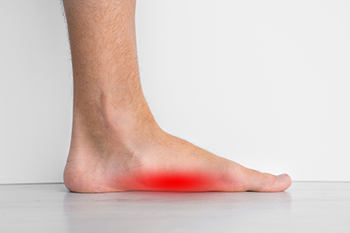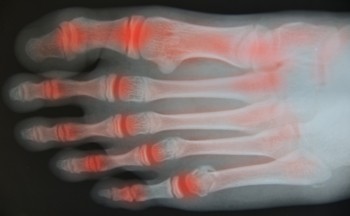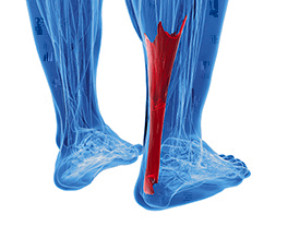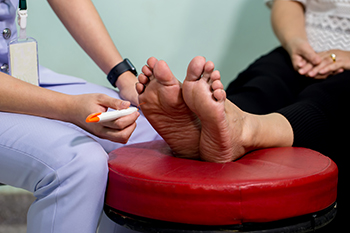Items filtered by date: September 2023
Causes and Relief Solutions For Flat Feet Pain

Flat feet, also known as fallen arches, can be a source of persistent discomfort and pain for many individuals. This common condition occurs when the arches of the feet collapse, causing the entire sole to make contact with the ground. Understanding the root causes of flat feet pain is the first step toward finding effective solutions. One primary cause of flat feet pain is genetics. If you have a family history of flat feet, you are more likely to develop them. Additionally, injuries or overuse can contribute to the development of flat feet over time. Obesity and pregnancy can also put excess strain on the arches, exacerbating the condition. The good news is that flat feet pain can often be managed and relieved. Wearing footwear with proper arch support can significantly reduce discomfort. Stretching and strengthening exercises may help improve foot and leg muscle function, offering relief from pain associated with flat feet. In more severe cases, medical intervention or surgery may be considered. If you have flat feet, it is suggested that you consult a podiatrist who may prescribe custom orthotic inserts, which can provide tailored support.
Flatfoot is a condition many people suffer from. If you have flat feet, contact Dr. John P. Beaupied from Palos Podiatry. Our doctor will treat your foot and ankle needs.
What Are Flat Feet?
Flatfoot is a condition in which the arch of the foot is depressed and the sole of the foot is almost completely in contact with the ground. About 20-30% of the population generally has flat feet because their arches never formed during growth.
Conditions & Problems:
Having flat feet makes it difficult to run or walk because of the stress placed on the ankles.
Alignment – The general alignment of your legs can be disrupted, because the ankles move inward which can cause major discomfort.
Knees – If you have complications with your knees, flat feet can be a contributor to arthritis in that area.
Symptoms
- Pain around the heel or arch area
- Trouble standing on the tip toe
- Swelling around the inside of the ankle
- Flat look to one or both feet
- Having your shoes feel uneven when worn
Treatment
If you are experiencing pain and stress on the foot you may weaken the posterior tibial tendon, which runs around the inside of the ankle.
If you have any questions please feel free to contact our office located in Palos Heights, IL . We offer the newest diagnostic and treatment technologies for all your foot and ankle needs.
Treating Arthritis

Arthritis is a common condition causing joint pain and stiffness, and can often affect the feet. It affects one in six people over 50. Early joint preservation is crucial to maintain mobility and prevent pain. Building muscle strength, especially in smaller intrinsic foot muscles, is key to improving symptoms and quality of life. Understanding foot function through 3D gait analysis helps shift forces away from affected joints using methods such as strengthening, taping, footwear, or orthotics. While conservative treatments are preferred, sometimes surgery is necessary to maintain joint mobility. Joint fusion surgery is considered in severe cases when foot function is greatly impaired. If you have foot arthritis, it does not have to limit your life. It is suggested that you make an appointment with a podiatrist to help you preserve joint mobility, learn how to build muscle strength, and help you to understand foot function.
Arthritis can be a difficult condition to live with. If you are seeking treatment, contact Dr. John P. Beaupied from Palos Podiatry. Our doctor can provide the care you need to keep you pain-free and on your feet.
Arthritic Foot Care
Arthritis is a joint disorder that involves the inflammation of different joints in your body, such as those in your feet. Arthritis is often caused by a degenerative joint disease and causes mild to severe pain in all affected areas. In addition to this, swelling and stiffness in the affected joints can also be a common symptom of arthritis.
In many cases, wearing ill-fitting shoes can worsen the effects and pain of arthritis. Wearing shoes that have a lower heel and extra room can help your feet feel more comfortable. In cases of rheumatoid arthritis, the arch in your foot may become problematic. Buying shoes with proper arch support that contour to your feet can help immensely.
Alleviating Arthritic Pain
- Exercises that stretch the foot can prevent further pain and injury and increase mobility
- Most of the pain can be alleviated with anti-inflammatory drugs, heat, and topical medications
- Massages can help temporarily alleviate pain.
It is best to see your doctor for the treatment that is right for your needs and symptoms. Conditions vary, and a podiatrist can help you determine the right method of care for your feet.
If you have any questions, please feel free to contact our office located in Palos Heights, IL . We offer the newest diagnostic tools and technology to treat your foot and ankle needs.
Common Achilles Tendon Injuries

The Achilles tendon connects the calf muscles to the heel bone and plays a vital role in everyday movements. It allows you to perform actions like rising up on the toes, walking, and running. Despite its strength, the Achilles tendon is susceptible to various injuries that can be painful and debilitating. Achilles tendinopathy, also known as Achilles tendonitis, involves tiny tears in the tissue surrounding the tendon. These are often caused by overuse. Symptoms include pain, swelling, tenderness, morning stiffness, and decreased strength and movement in the affected leg. An Achilles tendon tear or rupture is a more severe injury that can result in sudden, sharp pain, swelling, bruising, and a loss of function, making it difficult to point the foot downward or stand on the toes. Some patients with partial tears may not experience noticeable symptoms. It's important to note that Achilles tendon issues often develop gradually due to cumulative damage. If you suspect you have incurred an Achilles tendon injury, it is suggested that you make an appointment with a podiatrist for the most suitable treatment approach for dealing with your injury.
Achilles tendon injuries need immediate attention to avoid future complications. If you have any concerns, contact Dr. John P. Beaupied of Palos Podiatry. Our doctor can provide the care you need to keep you pain-free and on your feet.
What Is the Achilles Tendon?
The Achilles tendon is a tendon that connects the lower leg muscles and calf to the heel of the foot. It is the strongest tendon in the human body and is essential for making movement possible. Because this tendon is such an integral part of the body, any injuries to it can create immense difficulties and should immediately be presented to a doctor.
What Are the Symptoms of an Achilles Tendon Injury?
There are various types of injuries that can affect the Achilles tendon. The two most common injuries are Achilles tendinitis and ruptures of the tendon.
Achilles Tendinitis Symptoms
- Inflammation
- Dull to severe pain
- Increased blood flow to the tendon
- Thickening of the tendon
Rupture Symptoms
- Extreme pain and swelling in the foot
- Total immobility
Treatment and Prevention
Achilles tendon injuries are diagnosed by a thorough physical evaluation, which can include an MRI. Treatment involves rest, physical therapy, and in some cases, surgery. However, various preventative measures can be taken to avoid these injuries, such as:
- Thorough stretching of the tendon before and after exercise
- Strengthening exercises like calf raises, squats, leg curls, leg extensions, leg raises, lunges, and leg presses
If you have any questions please feel free to contact our office located in Palos Heights, IL . We offer the newest diagnostic tools and technology to treat your foot and ankle needs.
Foot Problems Caused by Diabetes

For anyone living with diabetes, understanding potential foot problems and how to address them is of great importance. Conditions resulting from diabetes that can lead to significant foot issues are loss of protective sensation, also known as LOPS, and peripheral artery disease, or PAD. The former refers to the loss of feeling in the feet. This loss of sensation can prevent you from noticing discomfort, such as a pebble in your shoe or a cut or blister on your foot. Consequently, you might not realize when your skin is being injured, which increases the risk of infected sores. Ill-fitting shoes, foreign objects in shoes, sharp items on the ground, and extreme temperatures can all cause harm. Equally problematic is peripheral artery disease, which reduces blood flow to the feet. This can lead to pain, delayed wound healing, and the formation of foot ulcers. Individuals with PAD are at an increased risk of limb loss unless immediate action is taken. Regularly checking and safeguarding your feet, wearing well-fitting shoes, and seeking professional nail care are necessary steps to be taken daily. For help with foot issues caused by diabetes, it is suggested that you have a podiatrist on your team of medical professionals.
Diabetic foot care is important in preventing foot ailments such as ulcers. If you are suffering from diabetes or have any other concerns about your feet, contact Dr. John P. Beaupied from Palos Podiatry. Our doctor can provide the care you need to keep you pain-free and on your feet.
Diabetic Foot Care
Diabetes affects millions of people every year. The condition can damage blood vessels in many parts of the body, especially the feet. Because of this, taking care of your feet is essential if you have diabetes, and having a podiatrist help monitor your foot health is highly recommended.
The Importance of Caring for Your Feet
- Routinely inspect your feet for bruises or sores.
- Wear socks that fit your feet comfortably.
- Wear comfortable shoes that provide adequate support.
Patients with diabetes should have their doctor monitor their blood levels, as blood sugar levels play such a huge role in diabetic care. Monitoring these levels on a regular basis is highly advised.
It is always best to inform your healthcare professional of any concerns you may have regarding your feet, especially for diabetic patients. Early treatment and routine foot examinations are keys to maintaining proper health, especially because severe complications can arise if proper treatment is not applied.
If you have any questions please feel free to contact our office located in Palos Heights, IL . We offer the newest diagnostic and treatment technologies for all your foot and ankle needs.




